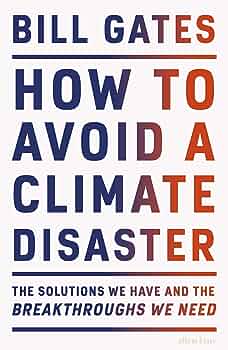This is a book that I have been curious about for a while, and also one I was a little cynical about. After all, you don’t really expect to get environmental messages from the world’s billionaires – especially as they’re the ones who are largely responsible for the extent of the crisis as it is. Having said that, I was very impressed by the book, and though he took the matter completely seriously, he did it with a level of optimism that you don’t often see when it comes to the climate crisis, which was refreshing.
However, though Bill Gates is optimistic, he is under no illusion that the changes needed are going to be easy to implement, or that there won’t be serious consequences if we fail to get to net zero carbon. He also acknowledges that it is people like him who have a greater responsibility to find and implement solutions, because they themselves played a much larger role in causing it. At the same time, he emphasises that everybody can play their part in solving the problem, even if it’s just in carefully thinking about how they vote in elections, or buying products which have been more ethically sourced.
Speaking of which, one aspect of the book that I found particularly interesting was when he talked about vegetarian and vegan diets being part of the solution. Methane from cows is a large contributor to worldwide carbon emissions, and he explains that transitioning to vegan alternatives, or even lab-grown meat, will be a good way of reducing some of the carbon. He explains that he is somebody who always enjoyed meat, and has been historically sceptical of fake meats, but that in recent times he has grown a lot fonder of them due to their increased quality. He does also stress, however, that while vegan options have the potential to be better for the environment, there are also times where they’re made unethically and in such cases can even be just as bad.
He goes over all of the different areas that contribute to the carbon in our atmosphere, and suggests how each and every one of them could be reduced, and what technologies and alternative fuels are available to replace them. He says a big part of them problem is that it is currently incredibly cheap to use oil, and explains that the reason for this is that so many governments have historically put systems in place to make it as affordable as possible. Originally, this was because it helped to improve quality of life for as many people as possible, but now that that is no longer the case, and even risks doing the exact opposite in the long run. Meanwhile, if steps were taken to charge a price for fossil fuels which accurately reflects the toll that they take, it would de-incentivise their use, especially among large businesses.
Outside of this, he also talks about drastic measures which can be taken to protect the human race in the event that climate change begins to accelerate a point beyond our control. One of which was releasing chemicals to create clouds which repel the suns rays and reduce the effects of global warming. It’s both comforting to think that there are plans for even the worst case scenarios, and also kind of bleak to think that such measures might have to be taken.
Overall, his message is that we need to invest more in alternative fuels and green technologies, discourage the use of fossil fuels as much as possible, and aim for zero carbon, not just a reduction. He admits, depressingly, that one of the most difficult hurdles to overcome is actually getting politicians to act in favour of the people, but as he is an expert on the subject, it is reassuring to read his very grounded solutions to the problems we are facing as a species – he admits he doesn’t have all the answers, but he sets forth some very agreeable ideas.
Rating: 9/10

